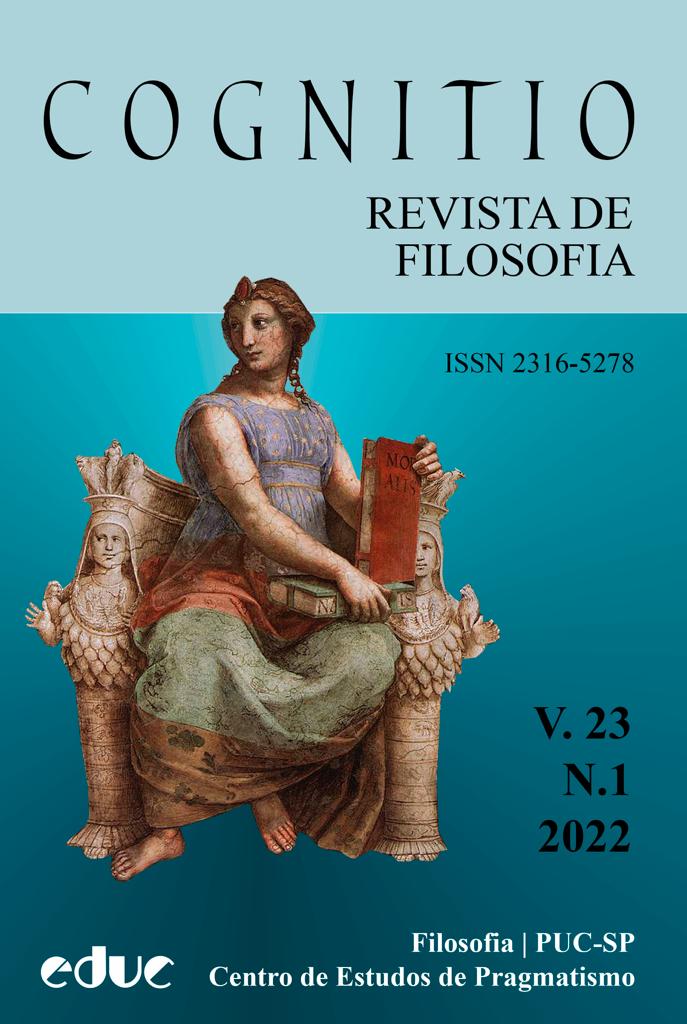John Dewey: a favor da ciência ou lições anti-negacionistas
DOI:
https://doi.org/10.23925/2316-5278.2022v23i1:e58538Resumo
No processo de reconstrução da filosofia, está colocado para John Dewey o desafio da articulação entre filosofia e ciência e, como consequência disso, a mudança no método de operar da primeira. Dewey desenvolveu um programa doutrinário que visa mostrar como o conhecimento se funda na experiência. Essa é a dimensão científico-naturalista da sua obra, cuja influência advém do naturalismo darwinista. Nesse sentido, o seu projeto consiste numa rigorosa argumentação contra as explicações em que a experiência e a natureza são apresentadas com base em distinções arbitrárias. Na obra Reconstruction in Philosophy, Dewey desenvolveu seu projeto metafísico de dimensão historicista, propondo uma reconstrução para a filosofia. Essa perspectiva é de inspiração hegeliana, considerando a história como “fluxo dos acontecimentos”. Sua argumentação consiste em reivindicar uma filosofia da experiência, na medida em que se apropria do método científico. Dewey tenta pensar um sistema desenvolvido a partir da aplicação do método científico à filosofia, mas tendo como base uma concepção filosófica da experiência. As concepções de Dewey acerca do conhecimento, do uso inteligente da razão e da natureza social da filosofia concorrem para a constituição de sua concepção de ciência. O objetivo do filósofo é desenvolver um projeto científico e metodológico que exigirá outra forma de fazer filosofia, que ele caracteriza como uma filosofia empírica. Embora Dewey defenda uma filosofia com uma visada científica, isso não significa que ele subordine a filosofia à ciência. Ocorre que Dewey se opõe à forma pela qual o problema epistemológico foi formulado pela tradição, ou seja, desconsiderando o processo de conexão entre as coisas e entre o conhecedor e as coisas. No presente artigo apresentamos este projeto filosófico denominado por nós de metafísica empírica. Iniciamos, argumentando a partir de Dewey, com a necessidade da constituição e formação de uma mentalidade científica tendo em vista os fins sociais. Esta reivindicação decorre do fato de Dewey considerar que ciência e democracia compartilham não apenas o mesmo padrão de investigação, o “método da inteligência”, mas também as mesmas virtudes morais: uma disposição para questionar, para procurar clareza e evidência, para ouvir e respeitar as opiniões dos outros, para considerar alternativas de forma imparcial, para mudar de ponto de vista em virtude da investigação e da comunicação. Por fim, discutiremos a teoria pragmatista da existência, cujo objetivo é a constituição de uma nova metafísica que consiste em administrar, no domínio temporal, o finito e o humano em sua relação com o eterno e o infinito, ou seja, visa apreender a realidade enquanto produto dos seus condicionantes. Em sua crítica à metafísica tradicional, Dewey deixa subentendido que o que se tem em termos dessas metafísicas não passa de técnicas intelectuais refinadas, derivadas das ideias rudimentares da fé popular acerca do sobrenatural e do natural, do divino e do humano.
Referências
DEWEY, John. Reconstruction in philosophy. Enlarged edition. With a new introduction by the author. Boston: The Beacon Press, 1957.
DEWEY, John. Experience and nature. New York: Dover Publications, Inc., 1958.
DEWEY, John. The quest for certainty: a study of the relation of knowledge and action. Minton, Balch, 1929.
DEWEY, John. The crucial role of intelligence. In: _____. Later works of John Dewey. Carbondale, Southern Illinois University Press, 1987, v. 11. p. 342-344.
DEWEY, John. The Influence of Darwin on philosophy. New York, Henry Holt and Company, 1910.
LAVINE, Thelma Z. America and contestations of modernity: Bentley, Dewey, Rorty. In: SAATKAMP, Herman J. (ed.). Rorty & pragmatism: the philosopher responds to his critics. Nashville & London, Vanderbilt University Press, 1995.
PINTO, Paulo Roberto Margutti. A abordagem pragmática do conhecimento. In: VAITSMAN, Jeni; GIRARDI, Sábato (org.). A ciência e seus impasses: debates e tendências em filosofia, ciências sociais e saúde. Rio de Janeiro: Editora Fiocruz, 1999. p. 73-92.
SHOOK, John R. Os pioneiros do pragmatismo americano. Trad. Fábio M. Said. Rio de Janeiro: DP&A, 2002.
Downloads
Publicado
Como Citar
Edição
Seção
Licença
Copyright (c) 2022 http://creativecommons.org/licenses/by/4.0/

Este trabalho está licenciado sob uma licença Creative Commons Attribution 4.0 International License.









